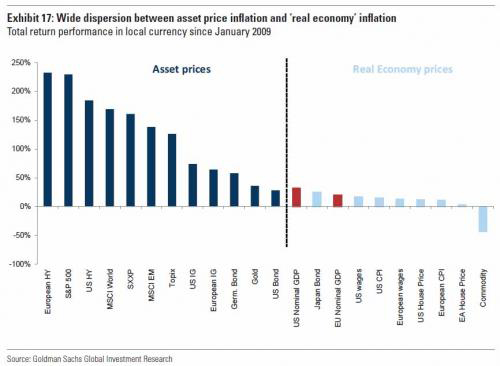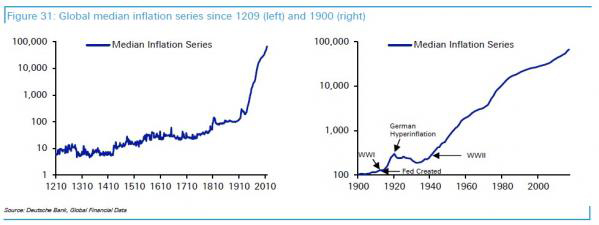Spot The Moment Inflation Turned Exponential
Tyler Durden

In the aftermath of a surreal Janet Yellen press conference, in which the Fed chair admitted that Fed "no longer understands" the "mystery" that is inflation, we did our best to explain to Yellen that the reason why the Fed's search for inflation has been fruitless, is because for nearly a decade it has been looking in the wrong place: the "real economy" where the Fed's impact has been negligible, as opposed to "asset prices" where the Fed has unleashed near hyperinflation.
Sadly, we doubt the Fed will understand what the chart below means.
Which of course, is ironic, because it was the Fed's arrival in 1913 that was the catalyst for inflation to snap and unanchor from 700 years of patterns, and to mutate from gradually upward sloping to spike exponentially over the past 100 years. Furthermore, as Deutsche Bank's Jim Reid writes, nothing will change, and Inflation remains the most likely outcome "until a new global financial system found." Incidentally, he adds the latter because even chief credit strategists of major banks have come to the same "tin foil" conclusion we unveiled in 2009, namely that the existing financial and economic (if not social) system is doomed as long as an unconstrained fiat regime, which creates ever greater and greater asset bubbles, remains.

Here is Jim Reid:
The chart below shows median global inflation first from 1209 (left) and then from 1900 (right). Inflation took on a totally different persona after the start of the twentieth century. The charts are again on a log scale to allow us to easily see the near exponential increase in inflation over the last 100 years or so, especially relative to what occurred before. Note that had we used the median instead of the average, the chart would look almost absurd given the extreme levels of hyperinflation seen in several countries over the last century. The data behind the right hand graph is based on a full set of 24 countries where we have inflation data back to 1900. Prior to this, many countries have data that goes back several decades with some back through the centuries. For the series back to 1210 we have included data as and when it becomes available.
And here is the log chart, both zoomed out and in, showing the catalyst that "broke" inflation: the creation of the Fed in 1913 ahead of World War I.

Yet while the chart above is familiar to most people with even a token interest in finance - except the Fed of course - what was found fascinating, was Deutsche Bank's solution to the problem: gold.
The various breaks with gold based currencies over the last century or so has correlated well with our financial shocks/crises indicator. It shows that you are more likely to see crises/shocks when we break from hard currency systems. Some of the devaluation to Gold has been mindboggling over the last 100 years.
Perversely, the current post Bretton Woods system also allows for huge operations/stimulus to overcome any crisis/shock. We also shouldn’t underestimate the positive impact that this can have on nominal asset prices. Cash is arguably a far more dangerous asset in a fiat currency but unstable regime than it is in a more stable less crisis prone one. However, by continually using stimulus to deal with crises and not letting creative destruction take over, you make a subsequent crisis more likely by passing the problem along to some other part of the global financial system, and usually in bigger size. In a fiat currency world, intervention and money creation is the path of least resistance. In a Gold standard world, mining new gold was the only stable way of increasing the money supply.
We think this leaves the current global economy particularly prone to a cycle of booms, busts, heavy intervention, recovery and the cycle starting again. There is no natural point where a purge of the excesses is forced by a restriction on credit creation.
So we’re quite confident that there will likely be another financial crisis/shock pretty soon with their frequency continuing to be high until we create a more stable global financial framework.
A new system, according to Reid, which resets the existing broken fiat-based one, and replaces it with one that is founded on sound money. To those who are speechless that one of the top strategists at the biggest European bank effectively has endorsed returning to the gold standard - a pastime typically relegated to the "fringe blogosphere" - strap in because far greater surprises are on their way in the coming months.

our mission:
to widen the scope of financial, economic and political information available to the professional investing public.
to skeptically examine and, where necessary, attack the flaccid institution that financial journalism has become.
to liberate oppressed knowledge.
to provide analysis uninhibited by political constraint.
to facilitate information's unending quest for freedom.
our method: pseudonymous speech...
Anonymity is a shield from the tyranny of the majority. it thus exemplifies the purpose behind the bill of rights, and of the first amendment in particular: to protect unpopular individuals from retaliation-- and their ideas from suppression-- at the hand of an intolerant society.
...responsibly used.
The right to remain anonymous may be abused when it shields fraudulent conduct. but political speech by its nature will sometimes have unpalatable consequences, and, in general, our society accords greater weight to the value of free speech than to the dangers of its misuse.
Though often maligned (typically by those frustrated by an inability to engage in ad hominem attacks) anonymous speech has a long and storied history in the united states. used by the likes of mark twain (aka samuel langhorne clemens) to criticize common ignorance, and perhaps most famously by alexander hamilton, james madison and john jay (aka publius) to write the federalist papers, we think ourselves in good company in using one or another nom de plume. particularly in light of an emerging trend against vocalizing public dissent in the united states, we believe in the critical importance of anonymity and its role in dissident speech. like the economist magazine, we also believe that keeping authorship anonymous moves the focus of discussion to the content of speech and away from the speaker- as it should be. we believe not only that you should be comfortable with anonymous speech in such an environment, but that you should be suspicious of any speech that isn't.
www.zerohedge.com
|




